On 23 May 2023, over 700 disability rights advocates gathered in the hemicycle of the European Parliament in Brussels with a purpose: building an inclusive future for persons with disabilities in the EU.
Jointly organised by the European Parliament and the European Disability Forum, the 5th European Parliament of Persons with Disabilities created an opportunity to discuss the demands of the disability movement, agreed in the EDF Manifesto on the European Elections 2024.
The event was opened by the President of the European Parliament, Roberta Metsola, and the President of the European Disability Forum, Yannis Vardakastanis.
Participants and panellists intervened in panels divided into three topics throughout the day: free movement and full participation in society; combating inequality, poverty and social exclusion; and working with international partners and other countries to create resilient societies.
Opening speeches
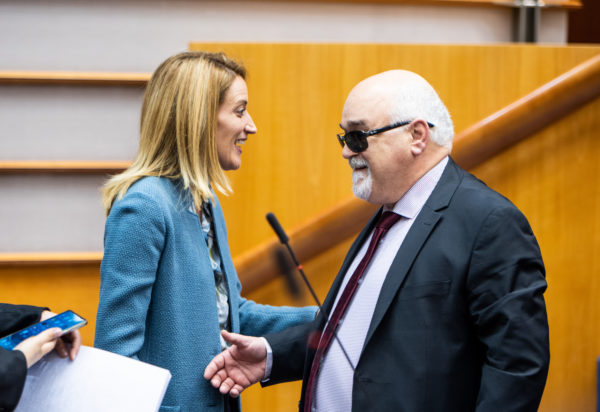
Credits: Michael Chia
The President of the European Parliament, Roberta Metsola, opened the event by welcoming participants, with a special note for the Ukrainian delegation that joined the event. She shared her support for the inclusion of Ukraine in the European Union.
She underlined that accessibility is still the exception rather than the norm. She praised organisations like the European Disability Forum and the work of civil society organisations to change this and move towards equal rights.
President Metsola reasserted the commitment of the European Parliament towards the implementation of the UN Convention on the Rights of Persons with Disabilities: equal participation (including political participation), living independently, availability of community-based services and the proposal for an EU Disability Card are some of the initiatives that the Parliament is working on. She told participants that she is committed to implementing measures to ensure persons with disabilities can work at all levels in the European Parliament.
The President shared the need to replace substitute voting with forms of voting that respect the personal, secret vote of persons with disabilities. She called for these forms of voting to be available in the next European Elections in 2024:
The European Union’s motto “united in diversity” means that everyone must have the opportunity to get involved in our European project. A European project of hope and opportunity that must be accessible to all. Having a disability should not hold anyone back, anywhere in Europe.
The President of the European Disability Forum, Yannis Vardakastanis, delivered the second opening speech, thanking the support of the European Parliament.
President Vardakastanis praised the commitment of disability activists, Members of the European Parliament and allies and their presence at the event – with 724 advocates present, it was the biggest edition so far.
He went on to reflect on the challenges and crises that the disability movement has been facing since the last edition, six years ago. He mentioned the COVID-19 pandemic, the Russian War against Ukraine (and how persons with disabilities are left behind during armed conflict), the increase in the cost of living, and the effects of climate change:
The COVID-19 pandemic was a stark reminder of how far we are in enjoying the same rights and protection as any other citizen.
The President reminded participants of how the disability movement has influenced EU policies. Due to our campaigning, disability was included as a protected ground from discrimination in the EU Treaties, EU Disability Strategies were developed, and legislation like the European Accessibility Act was adopted.
We need a strong European Union that truly embraces diversity and puts equality and inclusion at the centre of its policies.
He outlined a vision for a disability-inclusive future: full participation, effective protection against discrimination, equal access to all areas of life, equality for women with disabilities, a future free of coercive practices where all persons with disabilities can live independently, access education and employment and enjoy a good standard of life.
Free movement and full participation
The first panel of the 5th European Parliament of Persons with Disabilities discussed the right to enjoy all the benefits of being a citizen of the European Union, especially freedom of movement (working and living in another EU country) and exercising political rights.
Humberto Insolera, our Executive Committee member, and MEP Salvatore Da Meo, chair of the European Parliament’s Constitutional Affairs Committee, moderated the panel. Panellists included Věra Jourová, Vice President of the European Commission for Values and Transparency; Emilly O’Reilly, European Ombudsman; Karine Lalieux, Belgian Minister of Pensions and Social Integration; Alistair Gaetano represented Julia Farrugia Portelli, Maltese Minister for Inclusion, Voluntary Organisations and Consumer Rights; and Martin Conway, member of the Irish Senate. Nineteen participants took the floor.
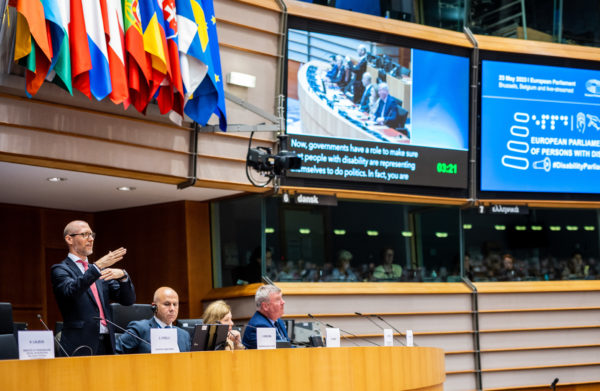
The main conclusions included:
- The European Disability Card is an essential initiative to expand freedom of movement, an initiative that needs the close involvement of organisations of persons with disabilities. However, it must be supported by funding and specific measures to support persons with disabilities in moving to another country.
- Authorities and political parties need to support persons with disabilities in getting involved in politics – from participating in political meetings to working as elected officials.
- Political decision-makers have an integral role to play in ensuring persons with disabilities can enjoy their rights.
- National and local authorities need to involve persons with disabilities – and their representative organisations – when developing any measure that impacts public life.
Read a summary of the debate on free movement and full participation.
Approval of the EDF Manifesto on the European Elections
After the panel, the President of the European Disability Forum gave an overview of the EDF Manifesto on the European Elections 2024.
He explained that Alexandre Gomez, a member of the European Disability Forum’s Youth Committee, was supposed to present the Manifesto with him. However, an unacceptable but common barrier impeded Alexandre from travelling to Brussels: the impossibility of finding and funding personal assistance. “Support services in the community and free movement are a right, not a luxury.”
He thanked participants for contributing to the Manifesto, a comprehensive blueprint of “the spirit and ambition of the European Disability Movement”.
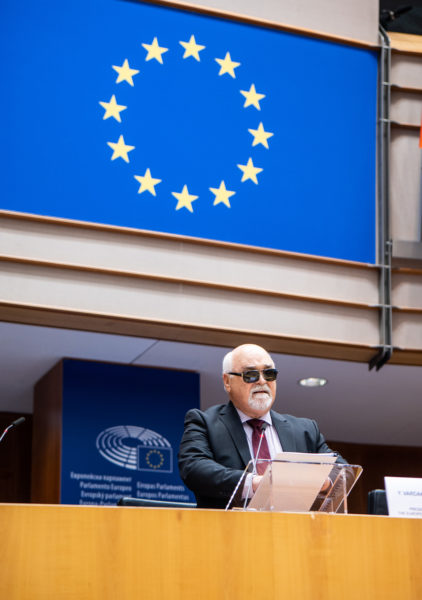
He outlined the main demands of the Manifesto: equal political rights, with no exceptions; creation of new EU structures to strengthen disability policies and a new European Agency for accessibility; swift adoption of an ambitious EU Disability Card; the creation of the Disability Employment and Skills Guarantee; the criminalisation of forced sterilisation of persons with disabilities; legislation on accessible and affordable assistive technologies; strengthening legislation on the rights of passengers with disabilities when travelling by air. The EU must help in a disability-inclusive reconstruction of Ukraine that develops accessible infrastructure and must agree on an EU budget that supports independent living, accessibility, inclusion and non-discrimination.
He shared that the meaningful involvement of persons with disabilities must be taken a step further. Persons with disabilities must be involved in all decisions affecting society, and the motto of the movement must move from “Nothing about us without us” to “Nothing without us”.
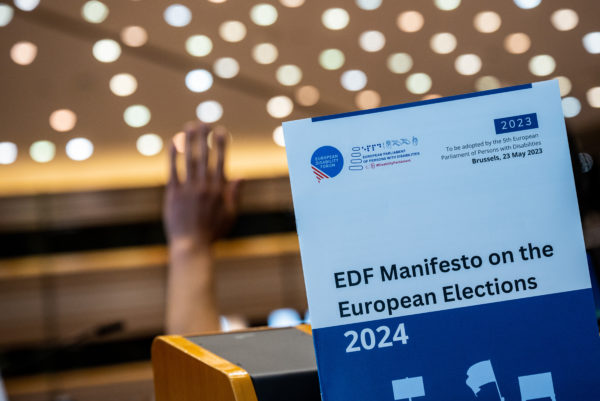
The delegates voted to adopt the full Manifesto.
Combating inequality, social exclusion and poverty
This panel focused on the problems caused by the lack of social inclusion and equality of persons with disabilities: growing poverty, increased cost of living, barriers to independent living and inclusion in education and the labour market.
Nadia Hadad, our Executive Committee Member, and MEP Marc Angel, Vice-President of the European Parliament, moderated the panel. Panellists included Helena Dalli, European Commissioner for Equality; Tamara Byrne, self-advocate for persons with intellectual disabilities representing Inclusion Europe and the EDF Youth Committee; Carlo Susias, President of the European Anti-Poverty Network; Tamás Kádár, Co-Director of the European Network of Equality Bodies (Equinet); and Markus Schefer, member of the UN Committee on the Rights of Persons with Disabilities.
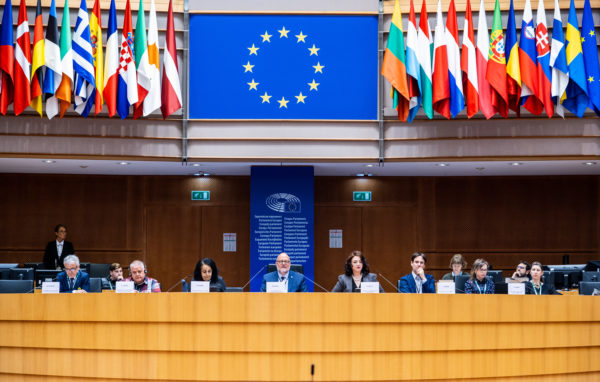
The main conclusions included:
- The importance of accessibility as an enabler of human rights and social inclusion;
- EU Funds must be used in accordance with the UN Convention on the Rights of Persons with Disabilities. The role of the EU Institutions in this is not only the disbursement of funds but also auditing to ensure compliance with the Convention.
- Governments must not reduce or remove disability allowances when persons with disabilities are in gainful employment. These allowances cover extra costs related to living in an inaccessible and unequal society.
- Authorities must pay special attention to the issues of women with disabilities and persons with disabilities that are a part of other marginalised groups.
- Disability disaggregated data must be collected.
- Programmes to support people out of poverty must be strengthened.
- Persons with disabilities and their organisations can reach out to equality bodies and the UN Committee on the Rights of Persons with Disabilities to report issues and contribute to better accountability by the government.
Read a summary of the debate on combating inequality.
Disability Inclusive Resilience
This panel focused on the challenges of ensuring persons with disabilities are protected and their rights upheld during crises and emergency situations. It looked at humanitarian crises, preparing for and mitigating disasters, the effects of wars and health and other emergencies. Panellists underlined how persons with disabilities must be involved in this work.
Gunta Anca, Vice-President of the European Disability Forum and MEP Katrin Langesiepen moderated the panel. Panellists included Janez Lenarčič, European Commissioner for Crisis Management; Valerii Sushkevych, Head of the National Assembly of Persons with Disabilities (NAPD), Ukraine; Paola Albrito, Director of the United Nations Office for Disaster Risk Reduction; and Idriss Maïga Alzouma, Chairperson of the African Disability Forum (ADF) and Second Vice-President of the International Disability Alliance.
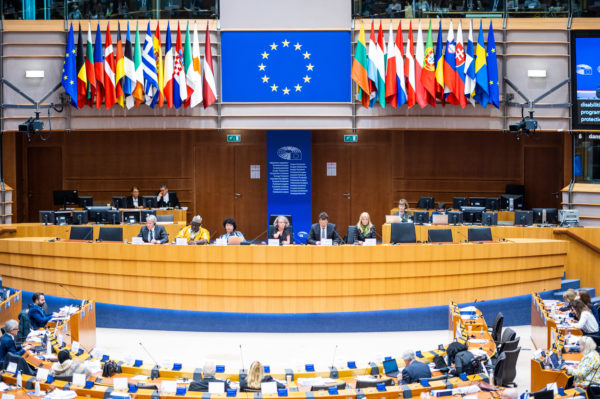
The main conclusions included:
- The importance of ensuring the accessibility of infrastructures and tools used during emergencies.
- Involving organisations of persons with disabilities in preparing and developing plans to deal with crises, disasters and other emergencies.
- The need to collect data disaggregated by disability and use that data when deploying humanitarian and development aid.
Read a summary of the debate on disability-inclusive resilience.
Closing Remarks
The event was closed by the Chair of the European Parliament Employment and Social Affairs Committee MEP Dragoş Pîslaru and by the European Disability Forum’s Vice-President Pat Clarke.
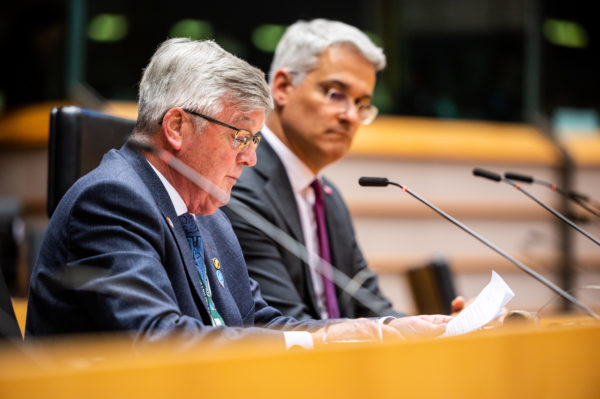
MEP Pîslaru closed the event by sharing that the most important part was the interventions from the floor. He congratulated participants for the adoption of the Manifesto.
I know the reality outside, immediately outside these doors, in Brussels, still remains a challenge for persons with disabilities. This reveals the problems that persist in many corners of Europe.
He underlined the need for EU Institutions to be accessible and inclusive and to put focus on disability issues. The Committee on Employment and Social Affairs is working to create a working group to implement the UN Convention on the Rights of Persons with Disabilities and a Disability Coordinator that works with all Committees. He also announced a Disability Rights week to be organised around the International Day of Persons with Disabilities.
Pat Clarke, EDF Vice-President, thanked participants for their active involvement during the preparation of the event and its duration. He outlined the value added in the diversity of participation, which represents several disability groups, countries, cultures and languages.
He reinforced that the active involvement of persons with disabilities is essential in political processes. He summarised the sessions, and called for a new European electoral law in line with the UN Convention on the Rights of Persons with Disabilities. He outlined accessibility’s importance in enjoying equal opportunities, rights and freedoms. He spoke about the possible impact of the current European Disability Strategy and the need to enhance equality legislation.
Disability inclusion must be a fundamental part of emergency preparedness and resilience building.
He spoke about the importance of the Manifesto as an important tool for advocacy and “as a guide for us all, and our advocacy at national level.”
He stated:
The event of today clearly demonstrates that we are a united movement, committed to a European project that leaves no-one behind. This commitment does not come without its challenges, (and) this gathering should serve as a reminder of the strength and diversity of the community to which we are part of.
He closed by thanking participants:
And finally (thanks) to all of you for your participation because the greatest democratic project, and this European Parliament of Persons with Disabilities, cannot be without you!